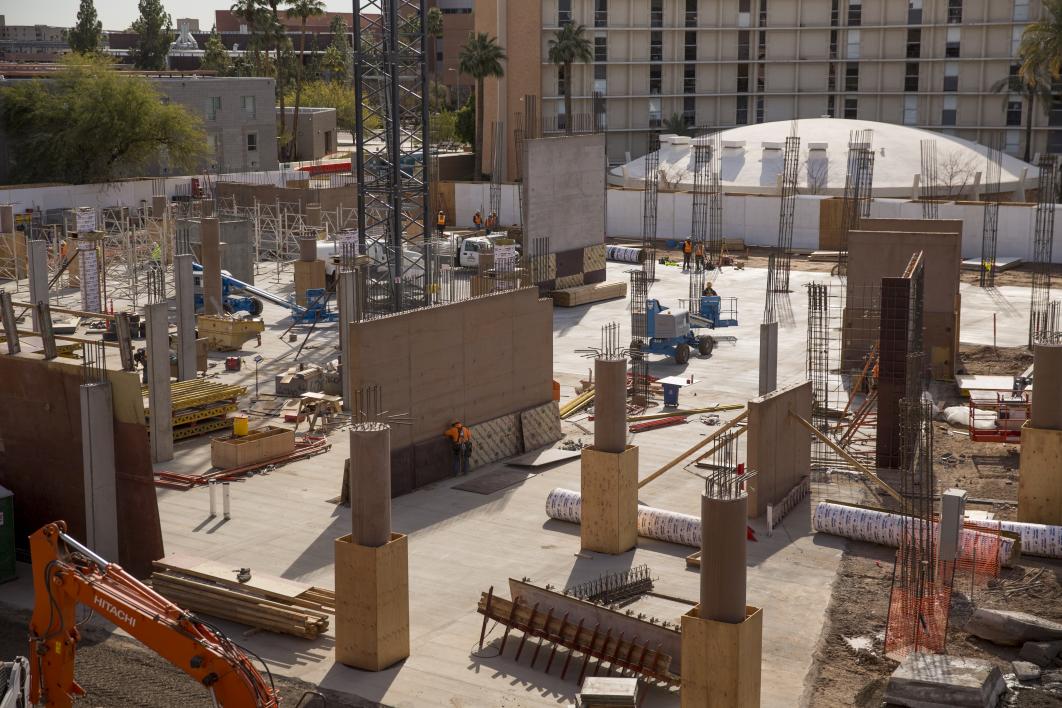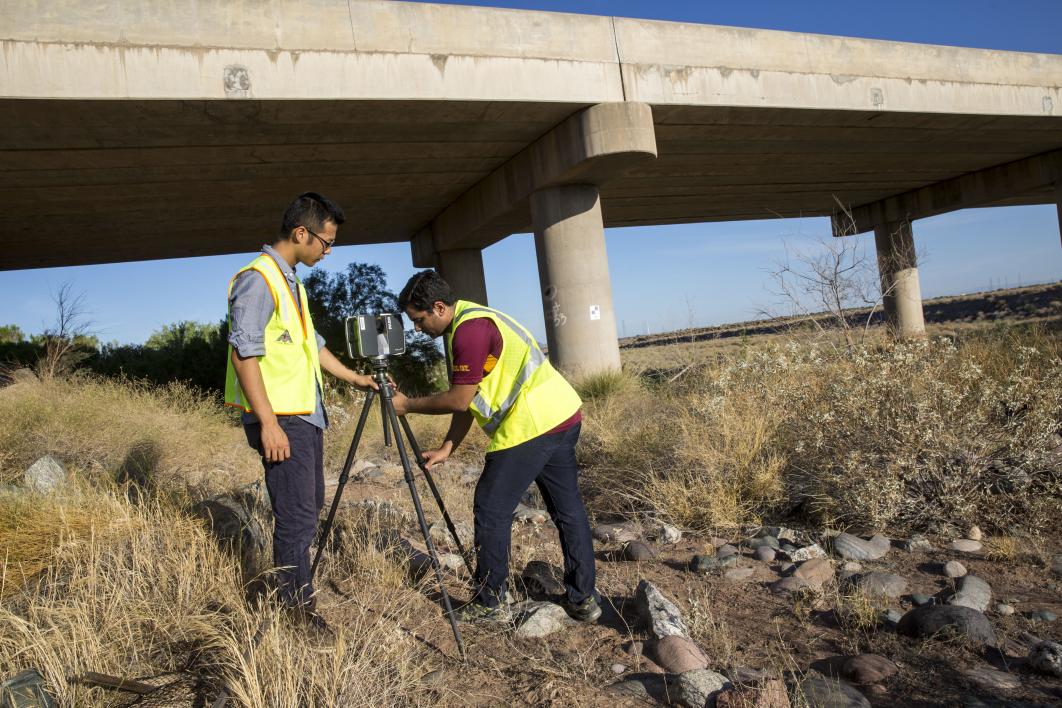Excelling in construction management today requires knowledge of an extensively and rapidly expanding set of new tools.
Fundamental business skills — budgeting, scheduling, project planning, contracting, personnel supervision and the like — are essential to effectively manage projects. But today’s increasingly multifaceted construction industry demands a trove of more wide-ranging talents.
Students pursuing construction management degrees in Arizona State University’s Del E. Webb School of Construction are exploring multiple branches of engineering, the scientific foundations of building methods and materials, and the intricate workings of advanced information, design and visualization technologies.
Acknowledging that multidisciplinary breadth and depth, the Office of the University Provost at ASU recently recognized the science, technology, engineering and math education that has been steadily integrated into the construction management program over the years by approving its reclassification from a business management program to a STEM program — formally a construction engineering technology/technician classification.
The recognition isn’t simply to reinforce the academic credentials of the program that’s accredited by the American Council for Construction Education. More than anything, the STEM designation will benefit students in significant ways, says Associate Professor Anthony Lamanna, chair of the undergraduate construction management program.
The STEM connection “carries more weight than ever” in the construction industry and the job market in general, says Lamanna, the Sundt Professor of Alternative Delivery Methods and Sustainable Development in the School of Sustainable Engineering and the Built Environment, one of the six Ira A. Fulton Schools of Engineering at ASU.
A degree in a STEM field tells prospective employers those graduates have the training and experience “to fit into a work environment that is technologically advanced, where the tech people are no longer just support staff but are equipped to be among the leaders of companies,” Lamanna said.
Beyond giving graduates the range of expertise to qualify them for higher-level positions, the certified STEM program can offer some extra advantages to at least two groups of students: U.S. military veterans and international students striving to establish careers in the United States.
Students who are on active military duty, reserve duty or who are civilian veterans are eligible for more financial support and more time to complete college studies when they are enrolled in STEM degree programs than in other programs.
Building today involves much more than the skilled craftsmanship on display at building sites, like that of ASU’s Palo Verde Main residential hall shown under construction here. The industry’s technological evolution has brought more advanced engineering techniques and more science-based approaches into the work performed before such projects get off the ground. Photo by Nick Narducci/ASU
That’s an especially big boost for those in the military who are transitioning into civilian life and seeking the education to launch careers, says Mike Gonzalez, the Southwest Region Director of McCarthy Building Companies, a major U.S. construction contractor. In 2018, the company’s Southwest region operations provided 28 internships and hired 30 full-time construction management graduates from STEM programs.
“It really helps those veterans who continue to work full time or part time to support their families while they are also going to college, which makes it difficult to earn a Bachelor of Science degree in just four years,” said Gonzalez, a 1991 ASU alumnus and graduate of the Del E. Webb School’s construction management program who in 2017 retired from the U.S. Army as a colonel after 30 years of service.
The GI Bill, which provides educational and other benefits for those who have served in the armed forces, helped to pay for Gonzalez’s studies at ASU.
The military now also offers the GI Bill STEM Extension to encourage veterans to pursue education in tech fields. The extension bill provides additional financial support for college expenses for up to nine months more than the 36 months covered by the standard GI Bill.
Nearly 10 percent of construction management students at ASU are veterans or still serving in the military. The program’s STEM designation “will make it more attractive to all students, but I think you will see an influx of veterans and improved graduations rates,” said Gonzalez, who is on the Del E. Webb School’s Industry Advisory Council Executive Board.
After four years in the U.S. Army, Jake Myers began working in January 2018 as a supervisor with the Phoenix-based residential and hospitality building company Genova-Detwiler.
From the time Myers interviewed for the job, his bosses, Aaron Genova and Cal Detwiler — alumni of ASU’s construction management program — urged him to consider studying construction management at ASU.
He checked out the program and learned of the high percentage of its students who land jobs in the field by the time they graduate and the money-making potential in the profession. Now the father of two plans to begin studies later this year — taking night classes while continuing to work full time.
For Myers, what the program and the GI Bill offer was enough to draw him to the program, but he knows earning a degree with the STEM designation will give prospective employers more confidence in his capabilities.
“The STEM factor is also likely to be a big draw for students from other countries,” said James Murphy, president and CEO of Phoenix-based Willmeng Construction and a 1998 graduate of the construction management program.
Construction professionals must have expertise in a broad array of emerging technologies. ASU’s construction management students are schooled in a variety of technologies to aid design and planning, as well as high-tech tools used in the field to guide building strategies. Here ASU students use a device to help identify sections of a bridge that need to be rebuilt or reinforced. Photo by Jessica Hochreiter/ASU
The ASU construction management degree will now give international students three years — rather than one — after graduation to secure a job in the United States, which will make it easier to establish permanent residency status in the U.S. and to later pursue citizenship.
Murphy attributes Willmeng Construction’s growth in large part to recruiting and hiring the most promising job candidates, regardless of their countries of origin. He considers it to be in the interests of the nation at large to have “the best and the brightest in the world” contributing their skills to strengthening the U.S. construction industry.
Being employed in the construction industry and having a degree from a STEM program at a U.S. university, “makes the quality of their applications to stay in the country significantly higher,” said Murphy, who is also a member of Del E. Webb School’s Industry Advisory Council Executive Board.
Today’s most highly sought-after construction management professionals are more tech savvy than ever, Gonzalez and Murphy say. Employers are looking for students who come out of school with the proficiency for the use of technologies for almost every aspect of the industry, whether it be accounting, project scheduling and contracting or applying mathematical and scientific principles to construction design and engineering.
That is why new courses in the Del E. Webb School focus on the operations and applications of innovative high-tech advances, including building information modeling, augmented and virtual reality, and machine learning.
“In almost every construction management course we teach, students are learning about new kinds of technology,” said program chair Lamanna.
The deeper level of STEM knowledge the field demands may be one reason for an increase in enrollment in the Del E. Webb School’s construction management master’s and doctoral degree programs, Lamanna adds.
The success of efforts to prepare the school and its students to be “poised for the future of the industry,” he said, is confirmed by a 100 percent employment rate for graduates of the program over the past several years, as well as the school’s stature as one of the leading university construction programs in the country.
Students also benefit from industry partners that support the school by sponsoring training programs, guest lecturing in classes, providing internships and hiring graduates of the program.
A STEM designation's value also includes elevating perceptions of both construction education and the construction industry.
Lamanna has talked to members of the school’s advisory council — including Gonzalez and Murphy — about how to further advance that reputation-enhancing impact.
“We’ve talked about figuring out ways to really change the image of the construction industry,” Gonzalez said, so its workforce is more accurately viewed as educated professionals rather than simply practitioners of a craft or laborers with only basic training.
Graduating students from a STEM program who are versed in an array of engineering and science fields and who exhibit a creative mastery of a variety of cutting-edge technologies ought to help dissolve such an outdated stereotype.
Top photo: Construction management students in ASU’s Del E. Webb School of Construction look over building plans for a major mixed-used development that has since been completed on the university’s Tempe campus. Photo by Jessica Hochreiter/ASU
More Science and technology

AI and robotics researchers at ASU work to keep people safe, healthy
As Arizona State Unviversity continues to shine in U.S. patent rankings, robotics and artificial intelligence garner a growing percentage of such technologies. Two faculty members among the…

A new chapter in national security research at ASU
In 1957, the Soviet Union launched Sputnik, the world’s first artificial satellite, into a low orbit around the Earth. Only the size of a beach ball, the satellite sent shock waves through the United…

One ASU researcher’s fix for freight’s costliest miles
America’s freight system is a miracle of modern logistics — until it isn’t. One snowstorm, one labor shortage, one delayed truck outside a major hub, and the whole process starts to wobble.…


